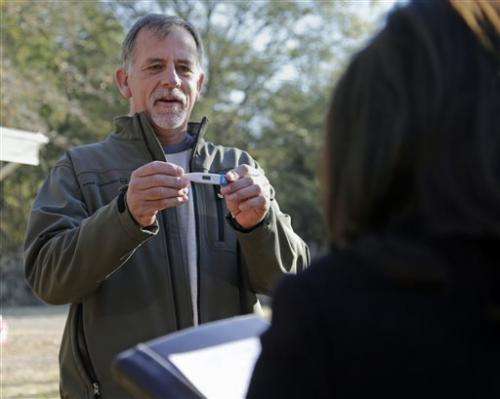At one month, US Ebola monitors finding no cases

The U.S. program that requires weeks of monitoring for travelers from African countries with Ebola reaches the one-month mark Thursday. And so far, no cases of the disease have turned up.
More than 2,600 people have undergone the 21-day ritual ordered by the federal government to guard against cases of Ebola from entering the country from West Africa. Now, anyone who has traveled from four West African nations is monitored for three weeks for fever and other signs of the disease.
It's up to local officials to decide how to keep track of the travelers who end up in their states, and determine what—if any—restrictions to impose. Most checking is done through daily phone calls, often with the person calling in to report their temperature and any symptoms.
And by all accounts, most travelers have been cooperative. Last week during a Congressional hearing, Centers for Disease Control and Prevention Director Tom Frieden said health officials lost track of only a tiny proportion of travelers—"less than 1 percent."
Success varies from place to place, but overall more than 95 percent of travelers from the countries are promptly contacted and monitored daily, according to CDC officials.
"State and local health departments have really stepped up to the challenge," said Randolph Daley, a CDC epidemiologist helping to coordinate the effort.
But there have been headaches. In the beginning, local health officials frequently complained they were getting bad contact information, or that travelers were getting or using the wrong phone numbers to dial in. Officials had to send their disease detectives out to track down the travelers.
On an average day, 90 to 100 passengers arrive in the U.S. from the West African countries struggling with the worst Ebola epidemic in world history—Guinea, Liberia, Sierra Leone and—more recently—Mali.
Those passengers are added to the lists, as others drop off.
"As it continues, it has become a strain," said Dr. Marcus Plescia, head of the Mecklenburg County Health Department, who was sending a nurse out to see a patient, a 25 minutes outside of Charlotte, North Carolina, until this week.
The U.S. didn't start checking passengers from West Africa until a Liberian man visiting Dallas came down with Ebola in September. At first, travelers were only checked upon arrival for a fever. But as Ebola anxiety spread across America and some in Congress pushed for a travel ban, the Obama administration began to ratchet up its measures.
Today, anyone who is traveling to the U.S. from West African countries with Ebola is funneled through one of five major airports. They are given thermometers and told to check their temperature twice daily. They are also required to provide contact information for themselves as well as a friend or relative, which is relayed to state health officials.
The program also tracks workers at U.S. hospitals where Ebola patients were treated.
It was created more for political than medical reasons, said Stephen Morse, a Columbia University infectious disease expert.
"Everyone in office wants to be seen as doing something," he said.
Monitoring is not the best way to control Ebola in this country, said Dr. Jay Varma, deputy commissioner for disease control at New York City's health department. Better approaches would be sending medical help to West Africa to stop the epidemic and preparing U.S. hospitals to handle Ebola cases here, he said.
© 2014 The Associated Press. All rights reserved.













